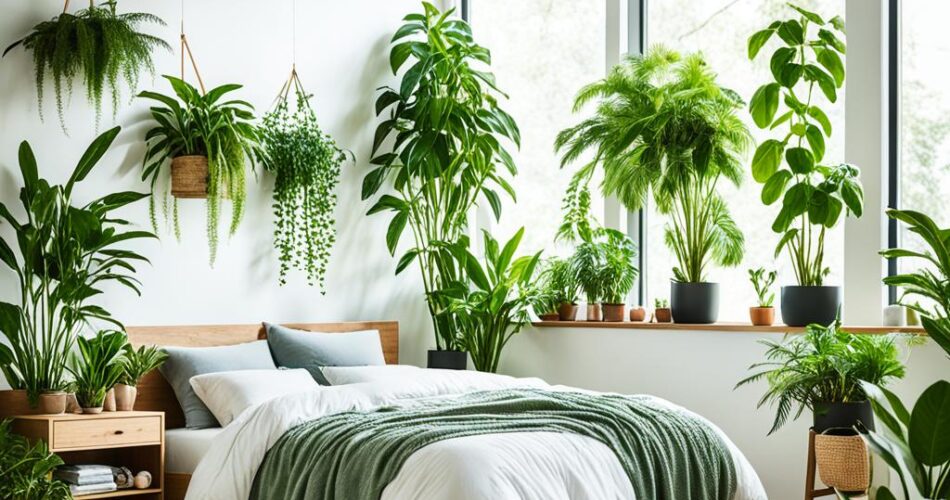Enhancing your sleep quality is vital. Choosing suitable bedroom plants purifies air, reduces stress, and promotes calmness. Transform your sleeping space with carefully selected indoor plants.
Key advantages of bedroom plants include improving indoor air quality, creating calming fragrances, selecting low-maintenance options, and ensuring pet-friendly choices. Proper care with light and water ensures thriving plants for better sleep.
Key Takeaways
- Plants like snake plants and peace lilies naturally purify air, enhancing indoor air quality for better slumber.
- Lavender, jasmine, and gardenia emit relaxing fragrances, promoting rest in the sleep environment.
- ZZ plants and pothos offer low-maintenance options, making them ideal bedroom plants for busy lifestyles.
- Spider plants and African violets are pet-friendly, allowing you to enjoy indoor plants without toxicity concerns.
- Providing adequate light and watering ensures your bedroom plants thrive, contributing to a restful sleep atmosphere.
Introduction to Bedroom Plants
Bring natural beauty to your personal space. Bedroom plants add vibrant colors and textures. They purify air and relieve stress.
These living companions promote better sleep quality. They regulate humidity in your sanctuary.
Benefits of Having Plants in the Bedroom
Bedroom plants offer many advantages:
- Improve air quality by removing toxins. Increase oxygen levels for fresher air.
- Reduce stress with a calming atmosphere.
- Promote better sleep quality through purification.
- Enhance mood and overall well-being.
- Add warmth with natural decor.
Common Misconceptions About Bedroom Plants
Let’s address some myths about plants:
- Plants release oxygen during the day.
- Proper care prevents mold or mildew.
- Many varieties are hypoallergenic for allergies.
- Caring for bedroom plants is low-maintenance.
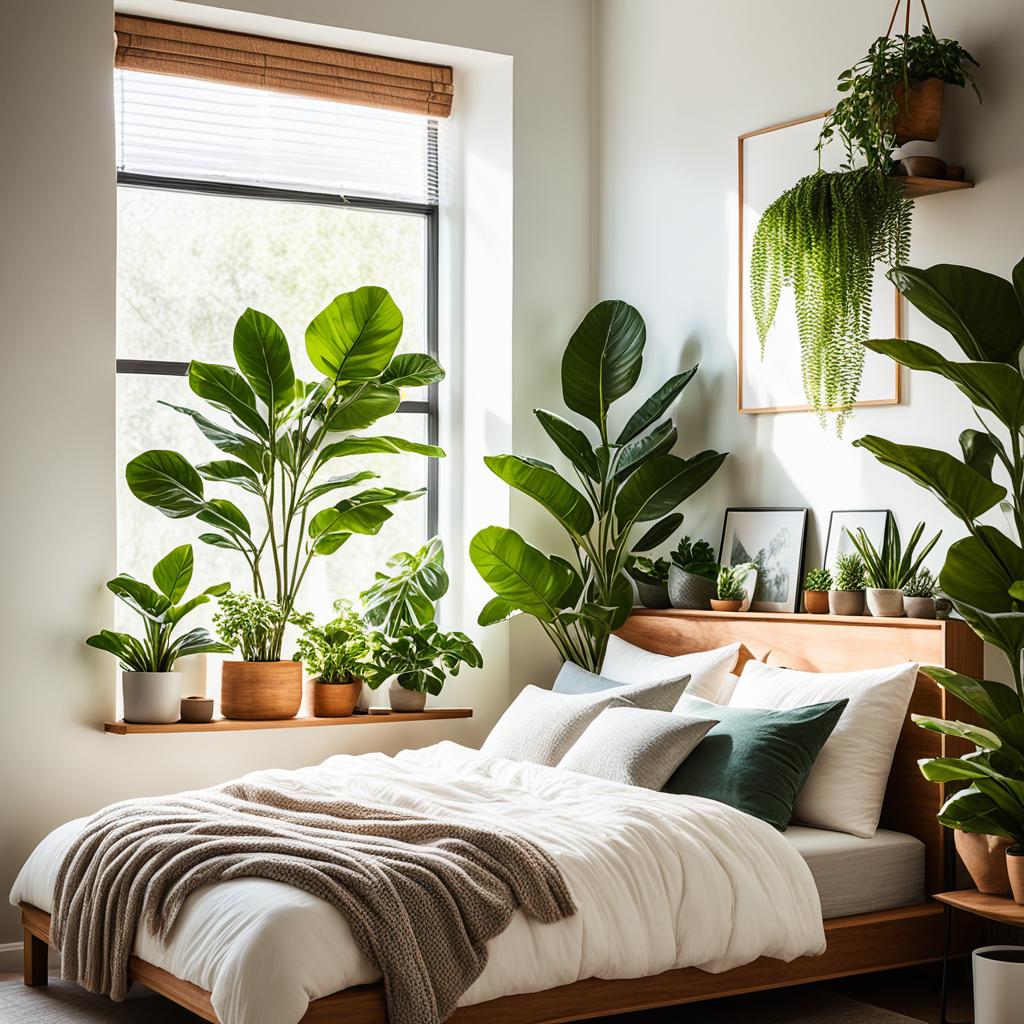
Air-Purifying Bedroom Plants
For a serene, healthy sleep, certain plants purify bedroom air. A NASA study in 1989 found plants filter pollutants like formaldehyde and benzene commonly found indoors.
Snake Plant (Sansevieria)
The snake plant powerfully purifies air. The NASA study showed it removes nearly all toxins. Releasing oxygen at night, it’s ideal for bedrooms, helping you breathe easier sleeping.
Peace Lily (Spathiphyllum)
The peace lily beautifies bedrooms with white flowers and green foliage. It excellently filters toxic gases like benzene and formaldehyde, improving indoor air quality.
English Ivy (Hedera helix)
English ivy, a classic climbing vine, potently purifies air. The NASA study highlighted its ability to reduce airborne mold and feces, making it great for allergy sufferers.
Incorporating these plants in bedrooms creates a healthier, restful sleep environment. They improve indoor air quality while adding natural, calming presence.
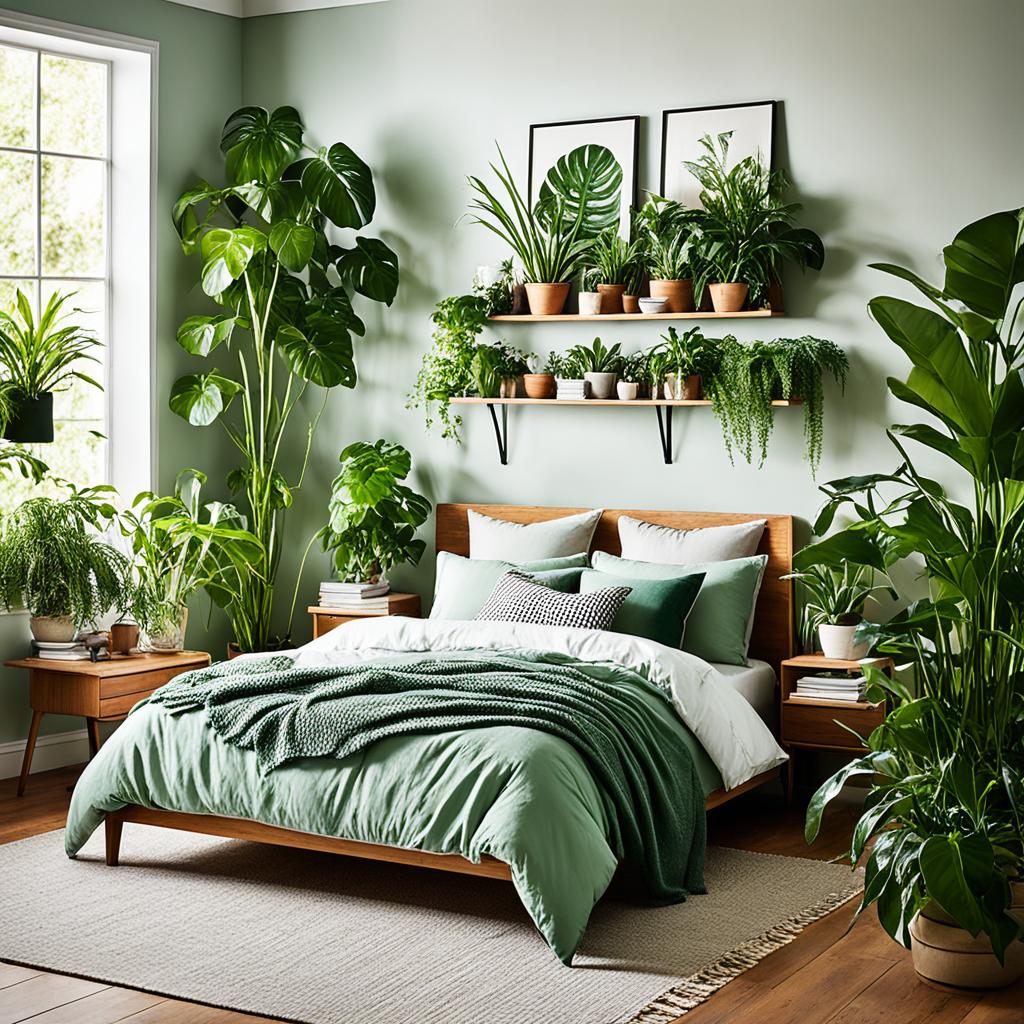
Sleep-Promoting Bedroom Plants
Creating a calm bedroom environment is key for restful sleep. Nature offers sleep-promoting bedroom plants that beautify your space. These plants emit calming scents and purify the air, promoting relaxation for better sleep quality.
Lavender
Lavender is renowned for its soothing aroma, proven to reduce anxiety. Studies show lavender induces calmness, making it ideal for peaceful slumber. With a mild sedative effect, lavender increases deep sleep, ensuring you wake up refreshed.
Jasmine
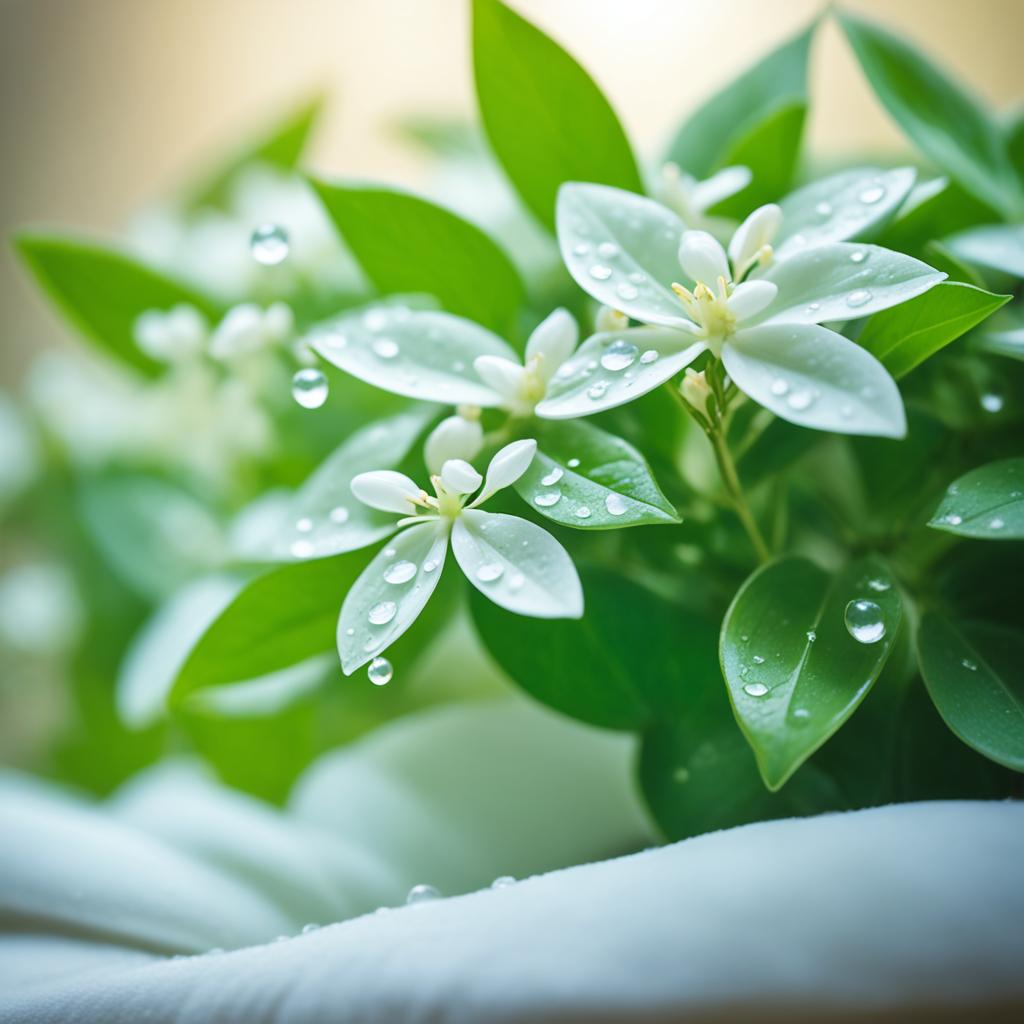
Jasmine’s sweet, floral fragrance enhances sleep quality and promotes daytime alertness. A study found jasmine scent led to greater sleep efficiency. German researchers discovered jasmine’s fragrance acts like a natural sleeping pill, inducing a calming, relaxing effect.
Gardenia
Gardenias are visually stunning plants with a sedative effect similar to sleeping pills. Their blooms release a soothing scent that enhances sleep, creating a peaceful, restorative bedroom environment.
- Lavender’s soothing aroma reduces anxiety and promotes better sleep.
- Jasmine’s sweet fragrance improves sleep quality and increases daytime alertness.
- Gardenias have blooms with a sedative effect for enhancing sleep.
Incorporating these natural remedies into your bedroom décor can create a sanctuary for quality rest. You’ll wake up feeling refreshed and rejuvenated.
Low-Maintenance Bedroom Plants
Creating a peaceful bedroom doesn’t require high maintenance. Certain houseplants thrive with little care. They purify the air while needing minimal attention. These easy-care plants are perfect for busy or forgetful plant owners.
ZZ Plant (Zamioculcas zamiifolia)
The ZZ plant thrives in low-light bedrooms. Its glossy green leaves and upright stems add elegance. This drought-tolerant plant is virtually indestructible. It’s ideal for those who forget to water plants.
Pothos (Epipremnum aureum)
Pothos, also called Devil’s Ivy, adapts remarkably to low light. Its trailing vines with variegated leaves cascade gracefully. This hardy vine purifies air while needing infrequent watering.
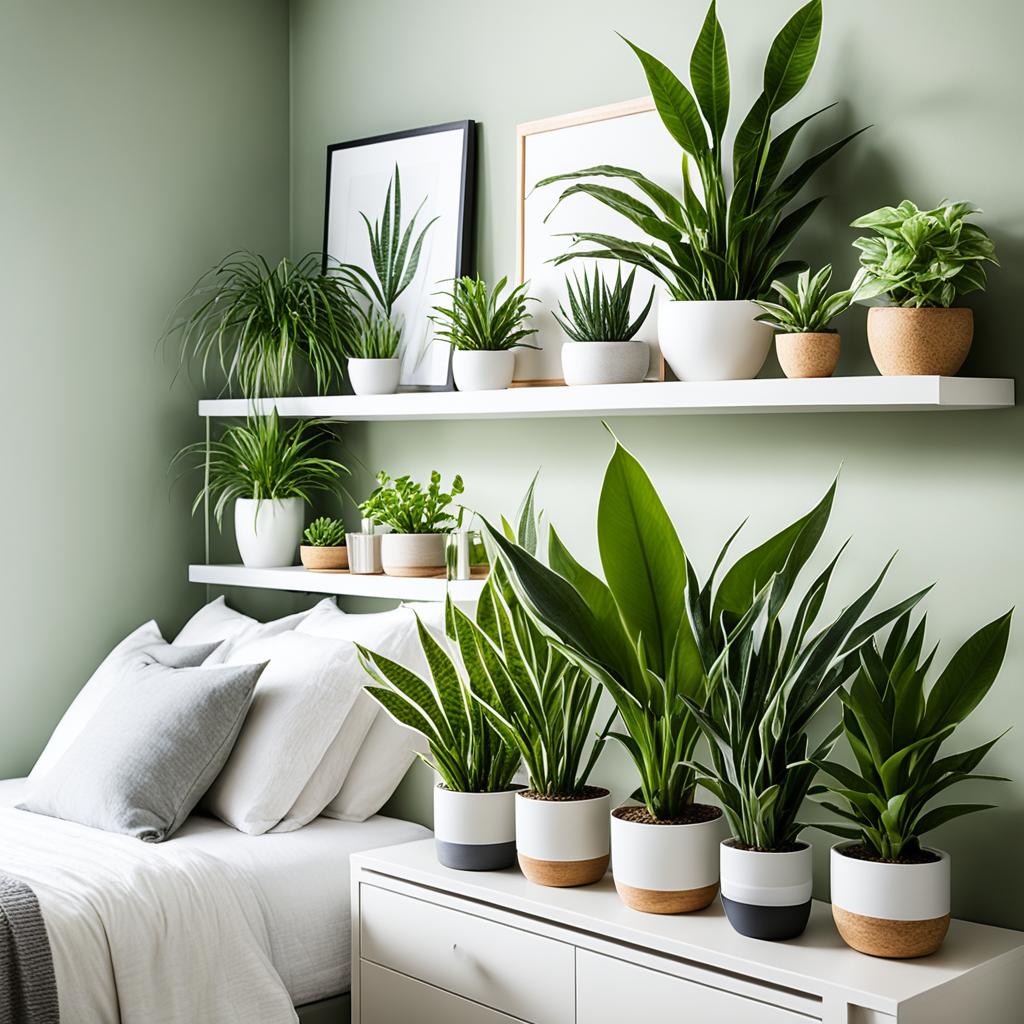
- The ZZ plant’s glossy foliage and striking upright stems create an elegant presence in the bedroom.
- Pothos, with its trailing vines and variegated leaves, adds a natural touch to any bedroom decor.
- Both plants are drought tolerant and thrive in low-light conditions, making them ideal low-maintenance houseplants for bedrooms.
“The greatest gift of the garden is the restoration of the five senses.” – Hanna Rion
Incorporate these low-maintenance plants into your bedroom. They enhance aesthetics and contribute to a healthier environment. Their air-purifying abilities and easy care make them practical yet beautiful additions.
Pet-Friendly Bedroom Plants
Adding plants to your bedroom creates a calming, rejuvenating space. But with pets, choose non-toxic varieties. Many indoor plants are toxic to cats and dogs if ingested.
Spider Plant (Chlorophytum comosum)
The spider plant is excellent for pet owners. It’s non-toxic to cats and dogs. Plus, it purifies air by removing formaldehyde and xylene. With cascading leaves and easy care, it’s a beautiful, low-maintenance addition.
African Violet (Saintpaulia)
African violets offer vibrant blooms and lush foliage. These non-toxic houseplants are safe for pets. Enjoy their beauty without worry. They thrive in bright, indirect light and add color.
Bamboo Palm (Chamaedorea seifrizii)
The bamboo palm is stylish and pet-friendly for bedrooms. It purifies air by removing pollutants, creating a healthier environment. While safe for cats, dogs may experience mild digestive issues if ingesting large quantities.

Choose these pet-friendly, air-purifying plants for serene, rejuvenating bedrooms. Ensure your furry companions’ safety.
- Only 26% of plant poisoning cases in pets involve cats, while dogs are more likely to get poisoned.
- The Ponytail Palm is safe for cats but can cause vomiting in dogs if ingested in large quantities.
- African Violet is safe for dogs but may cause vomiting in sensitive cats.
- The ASPCA provides a list of plants to avoid, ensuring pet owners access vital plant safety information.
Bedroom Plants for Specific Needs
Create a serene, restful bedroom with plants tailored to your needs. Seeking allergy-friendly options, natural sleep aids, or plants for small spaces? Find a verdant companion to enhance your slumber sanctuary.
Plants for Allergies
Allergy sufferers can benefit from certain plants in the bedroom. The peace lily reduces mold spores and allergens in air. The bamboo palm boosts humidity, making it less hospitable for dust mites. The spider plant traps dust and airborne particles, purifying air.

Plants for Insomnia
Struggling with insomnia? Invite nature’s sleep aids. Lavender’s soothing scent promotes relaxation and better sleep quality. Snake plants release oxygen at night, improving air quality for restful slumber. English ivy filters allergens and toxins for a fresher atmosphere.
Plants for Limited Space
Small spaces don’t limit green thumbs. Trailing pothos drape elegantly from shelves or hanging baskets. Compact ZZ plants thrive with minimal care. Petite African violets add delicate touches to tiny nooks.
With creativity, enjoy small space gardening’s benefits in cozy sanctuaries.
Select plants catering to your needs – allergy-friendly, natural sleep aids, or suited for limited square footage. Create a personalized bedroom oasis tailored to well-being and preferences.
Caring for Bedroom Plants
Adding plants to your bedroom improves decor and offers health benefits. Proper care ensures longevity and creates a restful environment. Here are tips for watering indoor plants, understanding their light requirements, and repotting and pruning techniques.
Watering Tips
Overwatering is a common cause of houseplant failure. Allow soil to partially dry between waterings. Check moisture levels by inserting your finger into the soil. If the top inch or two is dry, it’s time to water.
Different plants have varying water needs. Research the specific requirements for your low light houseplants. Succulents and cacti need infrequent watering, while tropical plants like peace lilies require more frequent hydration.
Use a well-draining potting mix to prevent waterlogged conditions. Avoid letting plants sit in standing water, as this can lead to root rot.
Light Requirements
Most low light houseplants thrive in indirect or filtered sunlight. East or north-facing windows typically provide ideal light levels. However, some plants, like succulents and cacti, prefer brighter conditions.
Observe your plants’ growth patterns and adjust their placement accordingly. Aloe vera releases oxygen in the dark, providing fresh air in the bedroom.
Repotting and Pruning
As plants grow, they’ll eventually outgrow their containers. Repotting houseplants annually in spring is recommended. Use fresh potting mix and a container 1-2 inches wider than the previous one.
This provides room for root expansion and allows the plant to continue thriving. Pruning plants is essential for maintaining health and shape.
Remove dead or damaged growth regularly. Occasionally trim stems to control size and encourage bushier growth. This process enhances appearance, promotes airflow, and discourages pests and diseases.
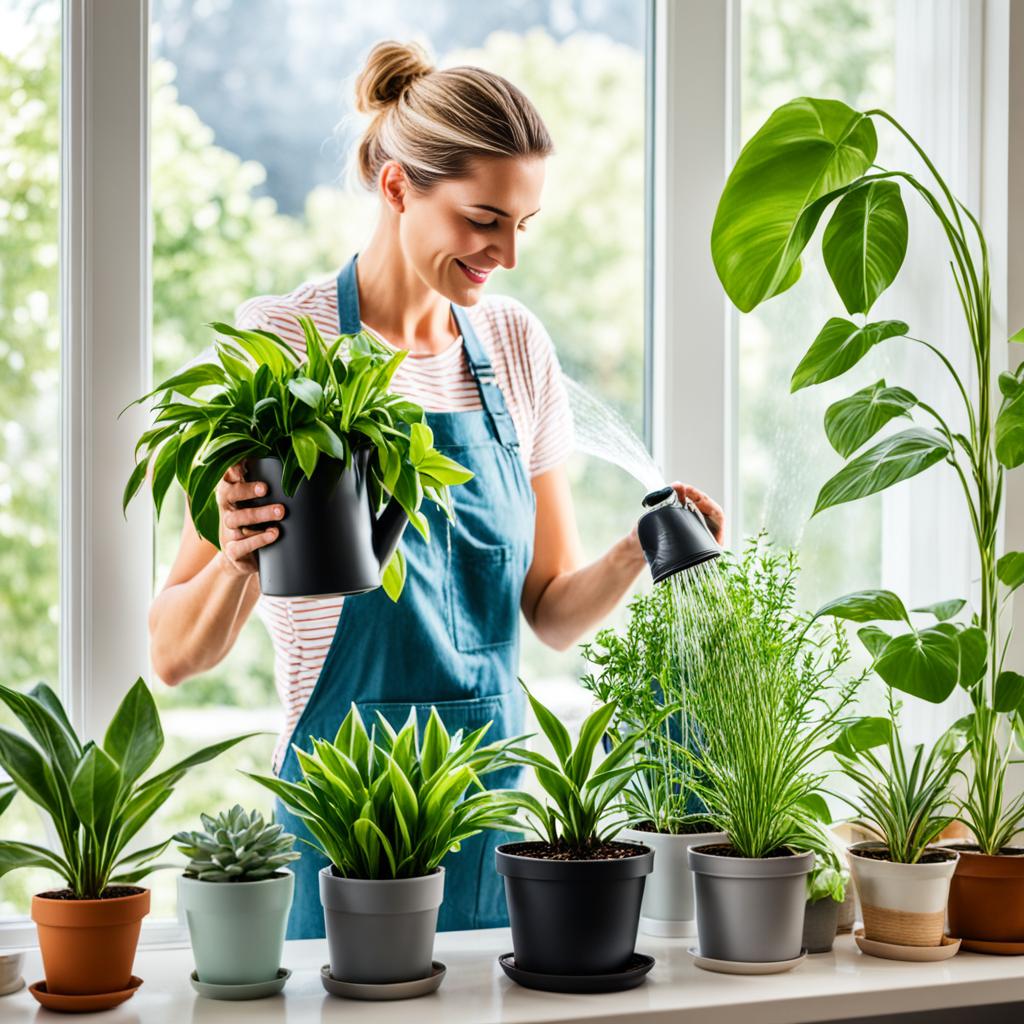
By following these care guidelines, you can create a serene and rejuvenating bedroom environment. Thriving plants purify the air and promote better sleep.
Bedroom Plants Decor Ideas
Transforming your bedroom into a serene and refreshing oasis can be achieved effortlessly by incorporating the right indoor plant decor. Beyond aesthetics, plants offer numerous benefits that promote a restful sleep environment. From purifying the air to creating a calming ambiance, thoughtfully placed greenery revitalizes your personal sanctuary.
Hanging Plants
Unleash the charm of hanging plant ideas in your bedroom by suspending lush, trailing vines like pothos or English ivy. These cascading beauties introduce vertical greenery and serve as captivating focal points. Consider positioning them near windows or accent walls to showcase their elegance.
Plant Shelves
Embrace the art of plant shelf styling by curating a collection of your favorite plants on stylish shelves or bookcases. This approach allows showcasing a variety of greenery, from petite succulents to vibrant flowering plants, creating a visually appealing display.
Experiment with complementary colors and textures to elevate the overall ambiance of your bedroom.
Terrariums
For a unique and low-maintenance touch, consider terrarium gardening. These miniature indoor gardens encased in glass vessels add whimsical charm and provide self-sustaining ecosystems.
Incorporate air plants, small ferns, or tiny figurines to create captivating centerpieces that blend nature with artistry.
Select plants that thrive in your bedroom’s lighting conditions. Experiment with various placements and enjoy the serenity nature brings to your personal sanctuary.
- 70% of people reported feeling more relaxed and calm in bedrooms with plants.
- 45% of individuals believe adding plants to their bedroom improved sleep quality.
- 25% of respondents stated reduced stress levels when incorporating plants into bedroom decor.
Conclusion
Adding the right bedroom plants can transform your sleeping space into a peaceful indoor oasis. These living companions promote a calming environment. Beyond aesthetic appeal, they offer multiple benefits.
Plants purify air by reducing toxins and allergens that disrupt sleep quality. Their presence decreases stress, enhances mood, and boosts productivity. By strategically placing air-purifying species like snake plants, peace lilies, and English ivy, you create a refreshing ambiance for deep, restorative slumber.
Fragrant bloomers like lavender and jasmine beautify your space. They also release soothing aromas that calm the mind and promote relaxation. Low-maintenance options like ZZ plants and pothos thrive effortlessly. You can enjoy their serene company without excessive care.
With proper plant selection and care, your bedroom plants become cherished allies. They cultivate a tranquil haven. Embrace nature’s power. Let these living companions guide you towards rejuvenating sleep. Transform your personal quarters into a true indoor oasis of serenity and well-being.
